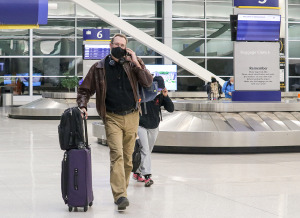
Roche lands $340M to make rapid antigen tests in Indianapolis
The contract is part of the U.S. government’s effort to double its procurement of rapid COVID-19 tests to be delivered for free to Americans through a forthcoming federal website.

The contract is part of the U.S. government’s effort to double its procurement of rapid COVID-19 tests to be delivered for free to Americans through a forthcoming federal website.
The unpredictability of shipping, labor and the coronavirus itself have created an environment where owners are often left guessing about when products might arrive and how much they’ll cost.
Nursing homes reported a near-record of about 32,000 COVID-19 cases among residents in the week ending Jan. 9, an almost sevenfold increase from a month earlier, according to the Centers for Disease Control and Prevention.
The Indiana State Department of Health on Friday reported 15,926 new cases of COVID-19, the second-highest mark during the pandemic, trailing the all-time high of 16,563 on Thursday.
The White House said the four-test limit on website orders will be applied to each residential address and will apply to the first tranche of 500 million tests. It estimates that the cost of purchasing and distributing the first block of tests at $4 billion.

Not only do you have to rearrange plans to visit customers or attend conferences, but you suddenly need to isolate in a hotel room, find restaurants that deliver, and perhaps reschedule flight and hotel plans.
The Indiana State Department of Health released the latest statistics for breakthrough cases, hospitalizations and deaths on Thursday.
Two brand-new COVID-19 pills that were supposed to be an important weapon against the pandemic in the United States are in short supply and have played little role in the fight against the omicron wave of infections.
The federal government plans will double to 1 billion the rapid, at-home COVID-19 tests to be distributed free to Americans, along with “high-quality masks.”

The Indiana House on Thursday removed language from a controversial employer vaccine mandates bill that would have financially punished employers for firing workers because they are unvaccinated against COVID-19.
The Indiana State Department of Health on Wednesday reported more than 15,000 new cases of COVID-19 and 125 additional deaths.
The Senate Health and Provider Services Committee voted to move the bill forward to the full Senate, after hearing testimony all in favor of the measure.
The reason: The COVID-19 variant has proved so wildly contagious that it may already be running out of people to infect, just a month and a half after it was first detected in South Africa.
Indiana Hospital Association President Brian Tabor said hospitals around the state “have reached a state of crisis with dwindling capacity left to care for patients.”
The shortages are widespread, impacting produce and meat as well as packaged goods such as cereal. And they’re being reported nationwide.
The company has climbed to the lead in global vaccine production with 3 billion doses in 2021 and is planning to produce up to 4 billion doses in 2022.
With the highly transmissible omicron variant spurring record levels of infections and hospitalizations, experts have repeatedly urged the Biden administration to recommend the better-quality masks rather than cloth coverings to protect against an airborne virus.
The move is a reaction to the severe hospital staffing shortages and crushing caseloads that the omicron variant is causing.
Under the new policy, first detailed to the AP, Americans will be able to either purchase home testing kits for free under their insurance or submit receipts for the tests for reimbursement, up to the monthly per-person limit.
COVID-19 patients occupy 37% of Indiana’s intensive care unit beds. The state has 12.6% of its ICU beds available overall.